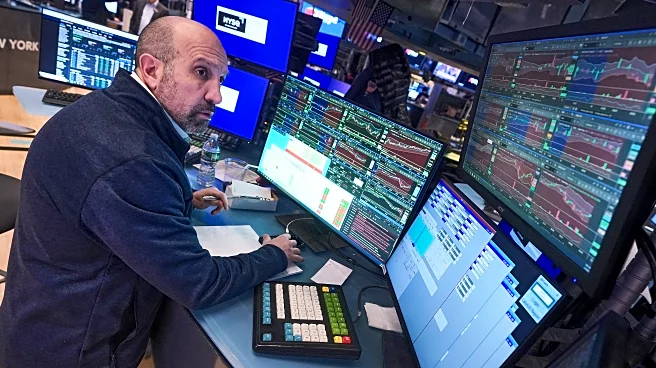What is the story about?
What's Happening?
Global shares experienced mixed trading on Wednesday following a pause in Wall Street's rally. Federal Reserve Chair Jerome Powell commented on the high valuation of stock prices, contributing to the market's cautious sentiment. European markets saw slight declines, while Asian markets showed varied performance, with Japan's Nikkei 225 recovering losses and Hong Kong's Hang Seng rising. Powell's remarks come after the Fed's recent interest rate cut, highlighting the central bank's challenge in balancing inflation concerns with employment issues. The Fed's cautious approach to further rate cuts reflects the complexity of managing economic risks in the current environment.
Why It's Important?
The mixed trading in global shares underscores the ongoing uncertainty in financial markets as investors react to the Federal Reserve's monetary policy signals. Powell's comments on stock valuations and the Fed's cautious stance on interest rate cuts highlight the delicate balance between supporting economic growth and controlling inflation. The market's response to these developments may influence investment strategies and economic forecasts. As the Fed navigates these challenges, its decisions will have significant implications for U.S. and global economies, affecting sectors such as finance, consumer goods, and international trade.
What's Next?
Investors and analysts will closely monitor upcoming economic data, including the Fed's preferred measure of inflation, to assess the potential impact on monetary policy. The Fed's approach to interest rate adjustments will be a key focus, as lower rates can stimulate economic activity but also risk fueling inflation. Market participants may adjust their strategies based on the Fed's signals, influencing stock prices and investment flows. Additionally, geopolitical factors and global economic conditions will continue to play a role in shaping market dynamics.
Beyond the Headlines
The Fed's cautious approach to interest rate cuts reflects broader concerns about economic stability and the potential for inflationary pressures. The central bank's decisions are influenced by complex factors, including labor market conditions and global economic trends. As policymakers navigate these challenges, the role of central banks in managing economic risks becomes increasingly critical. The situation also highlights the interconnectedness of global financial markets, where developments in one region can have ripple effects across others.
















